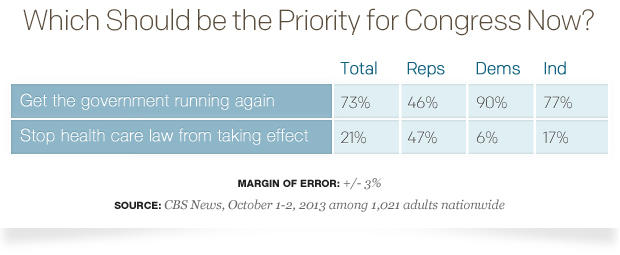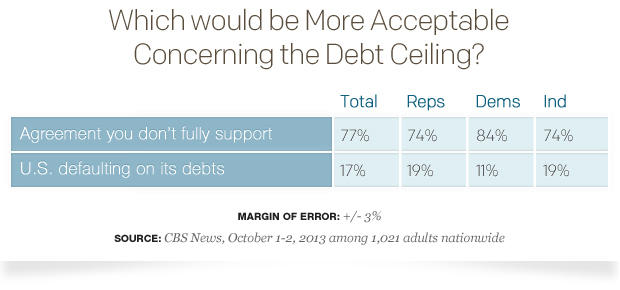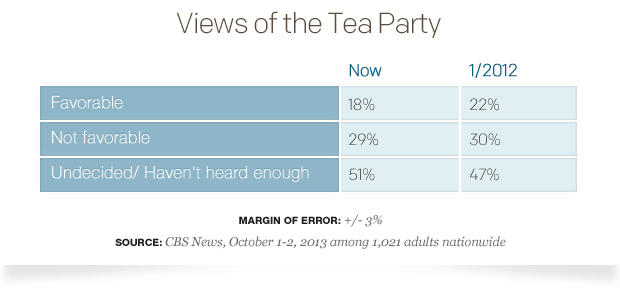Nearly 9 in 10 Americans displeased with Washington, poll says
By Sarah Dutton, Jennifer De Pinto, Anthony Salvanto and Fred Backus
As the partial federal government shutdown continues with no break in the impasse between Democrats and Republicans in Congress, nearly nine in 10 Americans are unhappy with the way things are going in Washington, including 43 percent who are angry - up 13 points since March and the highest since CBS News began asking the question in 2010.
- Poll: Americans not happy about shutdown; more blame GOP
- Full coverage: Government shutdown showdown 2013
Majorities across the political spectrum are displeased with Washington.
Budget Negotiations
Americans disapprove of how both sides are handling the budget negotiations, but more disapprove of congressional Republicans (72 percent) than President Obama and the Democrats in Congress (61 percent).
In the current budget debate, Americans think President Obama and the Democrats (48 percent) are more concerned than the Republicans in Congress (37 percent) about doing what is best for their family.
More generally, most Americans (61 percent) think congressional Republicans oppose the policies proposed by Barack Obama and the Democrats mostly to stop Democrats from gaining political advantage rather than because of a disagreement over policy. Americans are divided (47 percent to 43 percent) when considering why the president and Democrats oppose Republican policies.
The Government Shutdown and the Health Care Law
By a large margin, Americans say the higher priority for Congress should now be getting the government running again, rather than trying to stop provisions of the health care law from taking effect. But there are striking partisan differences here. Most Democrats and independents think Congress should focus on getting the government running, while for 47 percent of Republicans the priority for Congress is to stop the health care law.
Two-thirds (66 percent) of Americans think any agreement on the budget should be kept separate from discussions on the health care law. Twenty-six percent (including slightly more than half of Republicans) think any budget agreement should also cut off funding for the law.
Views of the Affordable Care Act are related to views of the shutdown. Those who like the health care law also overwhelmingly disapprove (87 percent) of shutting down the government. There is more support for the shutdown among Americans who don't like the 2010 health care law (38 percent), but most, 59 percent, disapprove.
Feeling the Effects of the Shutdown
Most Americans - 62 percent - don't think the federal government can operate effectively during a partial shutdown. This view is shared by majorities of Democrats (71 percent) and independents (63 percent). Republicans are divided.
Seventy-five percent of Americans think it is at least somewhat likely that the economy and the stock market will take a severe downturn due to the shutdown, including a third who thinks this is very likely.
Fifty percent of Americans think they will not be personally affected by the cutback in government services or programs caused by the shutdown, but nearly as many, 47 percent, expect they will be.
The Next Budget Deadline: Raising the Debt Ceiling
Even as the budget battle rages on, the Treasury Department has laid down another deadline in two weeks - a default on the government's debts unless the federal debt ceiling is raised on or before Oct. 17. A large majority of Americans - 77 percent - thinks it's more acceptable to reach an agreement on the debt ceiling that they don't fully support rather than have the U.S. go into defaults on its debts.
But Americans are divided as to whether such an agreement is likely to happen. Forty-seven percent think an agreement on raising the debt ceiling will probably be reached before the Oct. 17 deadline, while 46 percent think that probably won't happen.
Most Americans - 55 percent - think the debt ceiling should be raised along with spending cuts, while 23 percent think it should be raised without any spending conditions, and 20 percent think it should not be raised at all.
But a majority does not think raising the debt ceiling should be tied to defunding the Affordable Care Act. Twenty-six percent of Americans think any agreement should also cut off funding for the law, but far more, 69 percent, think any agreement on raising the debt ceiling should be kept separate.
Views of the Affordable Care Act
Most Americans (51 percent) continue to disapprove of the Affordable Care Act --including 40 percent who strongly disapprove. But 43 percent now approve, matching a previous high for the law reached in May 2010. Still, more Americans have disapproved than approved of the law since it was passed in 2010.
Forty-three percent of Americans think the health care law goes too far, while 31 percent think it is about right, and 20 percent think it doesn't go far enough. One in ten who disapprove of the law do so because they don't think it goes far enough.
Polling was conducted over the first two days that the new health insurance exchanges were open under the Affordable Care Act. After two days, 63 percent of Americans are aware that people can currently sign up for health insurance through the exchanges, while 22 percent are not.
Forty-five percent of those who are uninsured know that the exchanges are now open.
The Tea Party
Some lawmakers associated with the tea party have strongly opposed any resolution that does not defund or delay the 2010 health care law. Just 15 percent of Republicans think the tea party has too much influence in their party, while 41 percent say the tea party has the right amount of influence, and 30 percent think it has too little.
Overall, Americans hold net negative views of the tea party movement - opinions that have not changed much since early last year. Half of Americans are undecided or haven't heard enough about the tea party to hold an opinion. Republicans hold more positive views of the tea party than Democrats and independents do.
Twenty-one percent of Americans in this poll consider themselves supporters of the tea party movement - a figure that has mostly hovered around this level since early 2010. Support reached a high of 31 percent in November 2010, just after the midterm elections, and a low of 18 percent occurring a few times, including February 2010 and this past June.
_______________________________________________________________
This poll was conducted by telephone October 1-2, 2013 among 1,021 adults nationwide. Data collection was conducted on behalf of CBS News by Social Science Research Solutions of Media, Pa. Phone numbers were dialed from samples of both standard land-line and cell phones. The error due to sampling for results based on the entire sample could be plus or minus three percentage points. The error for subgroups may be higher. Interviews were conducted in English and Spanish. This poll release conforms to the Standards of Disclosure of the National Council on Public Polls.


